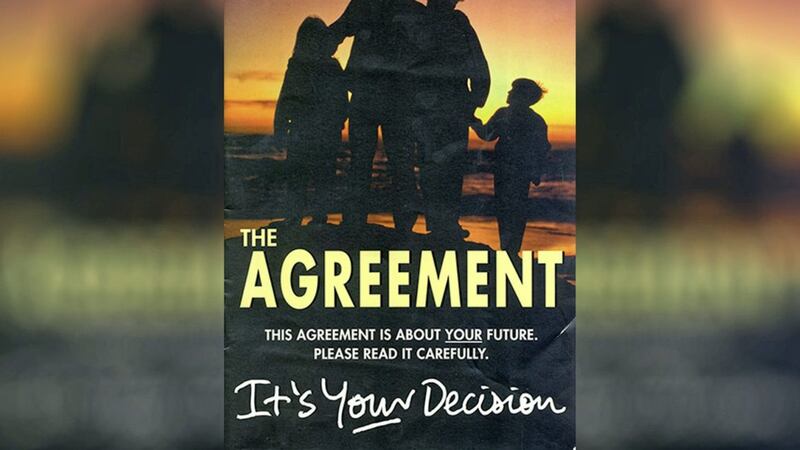Nobody could paint this as a great state of affairs, political parties about to fight elections to councils with nothing higher to aim for and minus the carefully-constructed, once-hopeful context.
A rescue job, again, will have to take this place out of itself. This, all the same, is not the worst of times.
From memory, and the record, not too many in 1998 called Good Friday the best of times. It was too fraught with bad feeling, and too tight a call. A number had been vocal in the run-up and were louder later in rating agreement on the terms so painfully haggled over as the worst of outcomes; sell out, surrender. The most noticeable communal response though was probably a sigh of sheer weariness. In time, as a nervous peace took hold, that became cautious relief.
The Agreement’s 21st anniversary merits note because Brexit has knocked the props away and revived mistrust. Who believed whole-heartedly in the Stormont project? The three strands of power-sharing, north-south and British-Irish relations were pinned up as interlocking structures without enough wind to fill their sails. Stormont as planned was too self-important and expensive for this size of a population. Power-sharing possibly made sense as a running workshop in civics; always a long shot and now a dead parrot.
Out in the streets on April 10 1998, beyond the smoke-filled rooms and crossed-out propositions, were minds more open to each other or to sizeable compromise? Not in this reporter’s memory. Expectations were rock-bottom. All many wanted, they said, was for ‘the fighting’ to stop. The wonder was that penned-in, wired-up teams from the UUs, SDLP and Sinn Féin, Alliance, Women’s Coalition, a tiny Labour party, could have been brought to nod through anything substantial enough to be formalised by referendums north and south.
‘People did not dance in the streets yesterday. They said, “I’ll believe it when I see it.” They said, “I wonder what the murdering bastards will get out of it.” They said, “It’s a con.” Most of these things they said to themselves, or in safe company.’ That was easily the most authoritative report of what many felt, by David McKittrick of the London Independent. But that was his report on August 31, 1994, on the IRA’s first ‘complete cessation of military operations’.
Britain and unionism mistrusted it from the start but it was a sizeable first step in the slow business of making a settlement. Though it broke down, slowly and predictably then suddenly and murderously with the Canary Wharf bomb in February 1996.
Good Friday 1998 to McKittrick was ‘breathtaking both in its scope and in the fact that so many of the major parties signed up for it.’ He noted the many loose ends. Ian Paisley’s DUP had stayed stubbornly, scornfully outside it, destabilising Ulster Unionists and their conflicted leader David Trimble. McKittrick cited the UUP dilemma, as voiced by one unusually eloquent pro-agreement councillor; ‘The past is gone, the present is full of confusion and the future scares the hell out of me.’ Yet the agreement, McKittrick thought, ‘felt like the stuff of history’.
Still no dancing in the street. The referendums the following month gave Good Friday’s blueprint of structures the endorsement of 95 per cent of nationalist Ireland. They also showed that unionism was split down the middle. Trimble signing up to the agreement amazed and delighted nationalists but made him the butt of Paisley’s vituperation. In advance ‘Gerry Adams and his associates were massaging their supporters towards a Yes vote’, McKittrick wrote. But most of those who chose Trimble to lead the UUs did so because they believed he would not compromise. He made the agreement, then wobbled. There were no leading unionists massaging their supporters to vote Yes.
Underneath upbeat rhetoric, republicanism was also torn. IRA decommissioning was eked out as bargaining material. The bad guys won, said Bernadette McAliskey: ‘It isn’t over ‘til the fat lady sings, and I ain’t singing’. As a tactic, moving as fast as the slowest ship in the convoy succeeded the earlier massaging. Hardest of hardliners Brian Keenan, deathly ill, made the promise in a graveside oration: ‘Not a bullet, not an ounce.’
On that 1998 Good Friday of freakish weather only the most hopeful imagined the end of wholesale violence. It eventually happened. Is a generation that cannot remember it about to re-heat the war because the DUP want a new kind of border? Assessing risk is one thing. Talking it up is sensationalist, inflammatory. And Easter is the traditional season for that.








